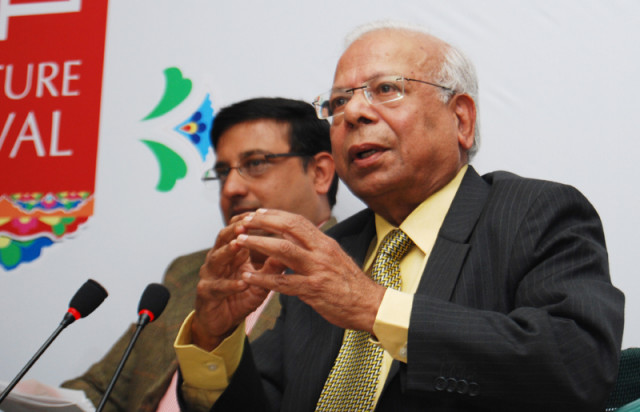Karachi Literature Festival 2012: A bit of forced optimism on Pakistan’s political economy
Economists seemed somewhat cheerier than journalists, but it was largely depressing all around.

The ability to be optimistic about Pakistan, it seems, depends on one’s level of knowledge of economics.
Of the four panelists at the session titled “Today’s Pakistan: An Economic and Political Perspective” at the Karachi Literature Festival on Saturday, two were journalists and two were economists. The economists – Asad Sayeed and former State Bank governor Ishrat Husain – talked in specifics, had hard recommendations and were generally optimistic about the country’s future. The journalists – Anatol Lieven and Maliha Lodhi – tried to sound upbeat but ended up sounding far more pessimistic about the country.
The session started off with the moderator Ghazi Salahuddin quoting a particularly dark passage from the introductory piece in this week’s The Economist special report on Pakistan, which seemed to set much of the tone for discussion, the cautious optimism of the economists notwithstanding. (Perhaps suitably, the microphones seemed to stop working whenever they were passed to the two economists.)
Considering the fact that this session clashed with a book launch featuring the erudite Mohammed Hanif, the room was surprisingly crowded, mostly with older people but with a healthy smattering of younger folks. The session itself, however, disappointed: it was a debate without being formatted as such and hence ended up being one where the panelists seemed to be talking past each other – with one brief exception – rather than to each other.
Nonetheless, several important themes came up consistently in each of the panelists’ talks.
Nearly every speaker, for instance, spoke about how the 18th Amendment to the constitution and the National Finance Commission award of 2009 were highly positive signs of devolution of power from the federal to the provincial governments. Their views on its significance, however, seemed to differ.
Maliha Lodhi, former editor of The News and Pakistan’s former ambassador to the United States, talked about these two events as what she felt were among the three most positive trends in the Pakistani political economy. (She listed three others that made her pessimistic.) Ishrat Husain, however, spoke of them as only the beginnings of what he felt was the most important transition Pakistan is going through.
“To my mind, that is the most important transition that needs to take place and there is no discourse over that,” he said. “Until we see empowered local governments, we will not see any real impact on the lives of ordinary citizens.”
Asad Sayeed pointed to the vastly increased transfers of revenues from the federal to the provincial governments as a sign of the irreversibility of the reforms.
Pakistan’s democracy was seen as something of a mixed blessing by nearly all of the panellists, though each chose to highlight it in different ways. Anatol Lieven chose to talk about how Pakistan’s transition to democracy was incomplete and as a result, the state had a multiplicity of power centres which resulted in both stability and stagnation: it makes most of society feel like they have a stake in the system, but does not lend itself to effective decision-making. He pointed to the example of Kalabagh Dam as one where a brutal dictator or a functional democracy might have been able to build a critical piece of infrastructure, but Pakistan’s current half-baked model seemed to get the country nowhere.
Asad Sayeed spoke of the need for regional integration and raising revenues as necessary steps for reviving economic growth. He also seemed to take exception to Lieven’s suggestion that there may be such a thing as a “Pakistani rate of growth” similar to the derogatory “Hindu rate of growth” that India was said to have had before the reforms of the 1990s. And he challenged Lieven’s assertion that Thar’s coal reserves were largely unproven.
The audience’s questions, however, seemed to depress the panellists even more than the state of the country: clichéd, uninformed and largely ignoring the crux of the discussion that had just taken place.
Published in The Express Tribune, February 12th, 2012.



















COMMENTS
Comments are moderated and generally will be posted if they are on-topic and not abusive.
For more information, please see our Comments FAQ